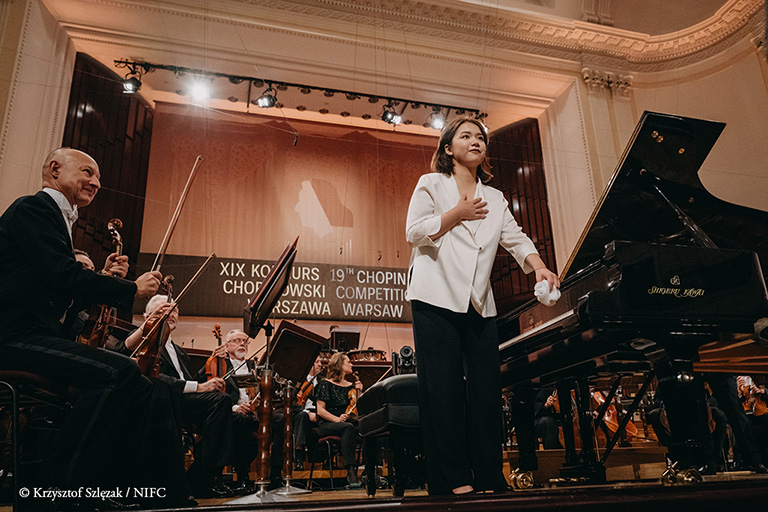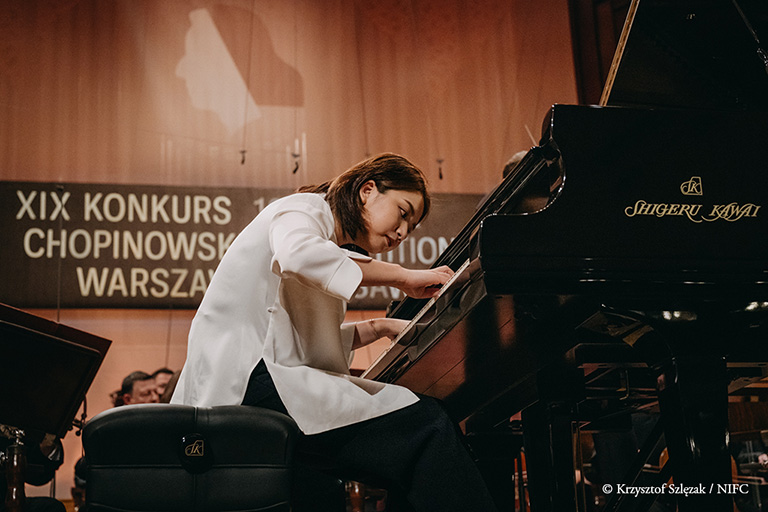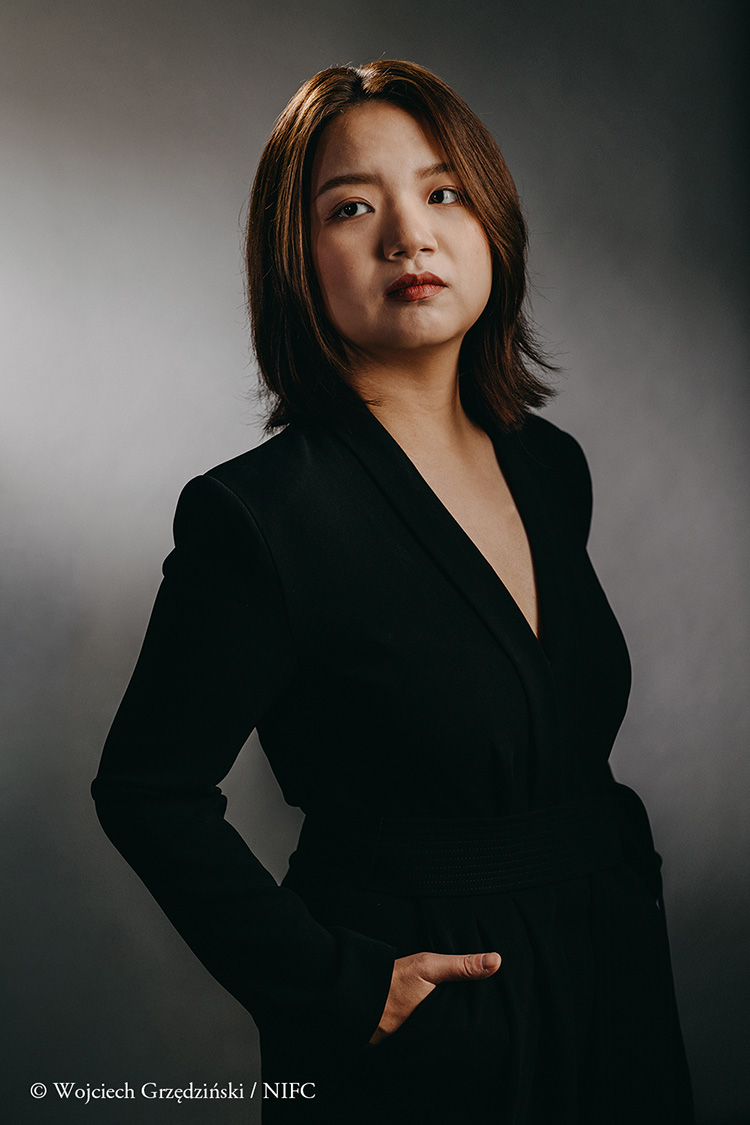NEWS
2025.11.11
Interview: Zitong Wang – 3rd Prize Winner of 19th International Fryderyk Chopin Piano Competition

From October 2nd to 23rd, 2025, one of the most esteemed international piano competitions in the world, the International Frydersadasdyk Chopin Piano Competition was held in Warsaw, Poland.
At this 19th edition of the competition, three finalists selected the Shigeru Kawai SK-EX full concert grand piano and won prizes.
We asked Ms. Zitong Wang, the 3rd prize winner of the competition about her feelings and thoughts for the competition and the Shigeru Kawai piano.
Interview
How did you feel about winning the prize?
I feel great! I feel very honored – this is such a great privilege. When I look at all the past prize winners, I still can’t believe it. I’m still just digesting all of this.
It’s also an honor for me to receive the Sonata Prize. That was something beyond my expectations.
I’ve known this Sonata No. 2 for a long time – I learned it when I was younger. Every time I play it, it brings me back. Especially this time, with Mr. Dang Thai Son’s guidance, it felt very emotional to include it in my third-round program. That made it very meaningful, so I’m very, very honored to receive everything.
What are your impressions of the Shigeru Kawai SK-EX full concert grand piano?
For me, choosing the Kawai piano during the piano selection was very, very easy. First of all, I only tried three pianos including Kawai, and it took me a little time to decide between Kawai and one other – just like four years ago. The other was the same one I played in the preliminary round, so I felt familiar with it. But the sound of the Kawai was so sensitive that I felt excited every time I played it.
My repertoire needed more brilliance in the top register and a darker feeling in the bass – not just loudness, but character. The top register required not only brilliance, but also a sense of lightness and articulation. I felt that only the Kawai piano could deliver that.
Overall, it was the most suitable piano for my program. One quality I truly loved was that it gave me a different character in every octave. That was surprising to me – in a good way – because most pianos sound even throughout, but for some reason, this piano gave such variety of tone that everything felt natural. I didn’t have to work hard to express those characters. My touch felt very easy while playing.
After the first round, Mr. Dang texted me, “I think Kawai was a great choice for you.” And I agree – it really suited my way of playing.
Also, the softer side of the Kawai – the touch I needed for delicacy and a singing tone – was perfect for the slower pieces in my program. Some people choose a piano based on how easy it is to play. Kawai wasn’t necessarily the easiest for me – I had to work on it – but I felt the effort was completely worth it, because I could achieve the sound I imagined. If I had prioritized ease of playing, I wouldn’t have gotten the sound I wanted. But with Kawai, once adjusted, it didn’t take much time to feel comfortable.
Overall, I loved playing on the Kawai in every situation. The more I played, the more I fell in love with it.

What are your plans for future activities and further challenges?
I just want to keep playing music. For me, music is something that heals me and is like my closest friend. The piano is where I can express everything, and music in general – not just piano – brings me peace.
I simply hope that, whether someone is listening online or in the concert hall, they feel they’re understood by me – even if it’s just one person. For me, performing is about human connection. That’s what really matters. When you go to a concert, there are moments where a single note or phrase might stay with you even though it’s not possible to absorb everything at once.
So, if someone can feel even just one of those moments in my performance, I would be very, very happy.
About Zitong Wang
Born on 3 February 1999, she studied with Dang Thai Son at the New England Conservatory. She has won first prize in international piano competitions: the Rosalyn Tureck Bach in New York City (2010), at Princeton (2020) and in Ferrol (Spain, 2022). In 2023 she won sixth prize in the Busoni Competition in Bolzano. She made her solo recital debut aged 13 at the Forbidden City Concert Hall in Beijing. She has performed at Verizon Hall in Pennsylvania, Severance Hall in Cleveland, Steinway Hall in New York, and in Beijing, Shanghai and Taipei, appearing with the Philadelphia, Cleveland, New Jersey and Galicia symphony orchestras under such conductors as Jahja Ling and Xian Zhang. In chamber repertoire, she has performed with Meng-Chieh Liu, Roberto Díaz and Chamber Music Northwest.
Official Instagram: @zitong_wang

Final round performance
About the International Fryderyk Chopin Piano Competition
Established and inaugurated in 1927, the International Fryderyk Chopin Piano Competition is one of the oldest music events of its kind in the world. 2025 will see the beginning of a series of special celebrations for its centenary. In the course of the past century, the formal aspects of the competition have constantly evolved, resulting in changing the number of its stages, programme, judging criteria, prizes, and also the media through which audiences have experienced the competition recitals. There have only been two elements of the Competition that have remained unchanged since its inception: Chopin’s music and the fascination of pianists and audiences alike. Another chapter in the hundred-year-long tradition is opening before us. The competition is organised by the Fryderyk Chopin Institute.
Official website: https://www.chopincompetition.pl/en
About the Shigeru Kawai SK-EX full concert grand piano
Unveiled in 2001 as the flagship instrument of the Shigeru Kawai line, the SK-EX concert grand piano is hand-crafted in limited numbers following a unique ‘prototyping’ creation process. In order to achieve the supreme range of expression required in a concert piano, each instrument utilises a variety of carefully selected materials, with premium aged spruce soundboards. Shigeru Kawai instruments adopt the advanced Millennium III keyboard action, featuring extended wooden keys and advanced ABS Carbon action parts, providing superior speed and responsiveness than conventional wooden action parts, allowing pianists to express a greater range of feeling and emotion in their performance.
Shigeru Kawai official website: https://www.shigerukawai.jp/en/

